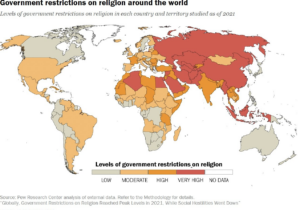Every year when Thanksgiving comes around, I am reminded of just how big a deal my own Calvinist tradition makes of gratitude. This emphasis on gratitude as the foundation and content of a moral life is vividly obvious in one of the most influential documentations of Calvinist belief, the Heidelberg Catechism, when it asks this very Calvinist question, “Since we have been delivered from our misery by grace through Christ without any merit of our own, why then should we do good works?”
The Heidelberg Catechism answers its own question as follows, “Because Christ, having redeemed us by his blood, is also restoring us by his Spirit into his image, so that with our whole lives we may show that we are thankful to God for his benefits, so that he may be praised through us, so that we may be assured of our faith by its fruits, and so that by our godly living our neighbors may be won over to Christ.” (With wry amusement I suppose I should admit that I am particularly aware of the grace that calls forth this gratitude whenever I lapse back into misery because of my own brokenness.)
“So that with our whole lives we may show that we are thankful.” I don’t imagine that every American is a Calvinist (and I am not the kind of Calvinist who would insist that every American should be a Calvinist), but as best as I can tell, thanksgiving – gratitude – is a widely felt, regularly celebrated, and profoundly healthy American sentiment.
As an immigrant sojourner in the USA, one of the things for which I am most deeply grateful is that this country’s constitutional laws and political culture gives me ample room to practice my Christian religion in private – and also allows me to give (however flawed) expression to my Christian discipleship in public life. Is America perfect in this regard? Certainly not. But even when Christians feel our deepest commitments to be in conflict with the laws and political practices of this country, we are free to work for change as Christians.
To give expression to our religious commitments and convictions both in private and in public is a rare and remarkable privilege when considered in global and historical perspective. Religious freedom may in principle be the first of all human freedoms, but in terms of political history it is a recent and hard-won innovation. To enjoy this privilege therefore appropriately calls forth gratitude – and along with that gratitude a desire to see the privilege extended to others.
After Paris, Muslims need Americans – certainly, American Christians – to celebrate and strengthen the magnificence of the constitutional arrangements of the USA that welcome Muslims as Muslims to be loyal citizens in this country’s robust democracy.
America is not France. The modern politics of France starts out from the French Revolution’s eviction of Christianity from public life in favor of the Enlightenment’s idolatry of human autonomy. This eviction is extended in French laïcité – secularism – to every religion (other than its own faith in humanity), including Islam.
The constitutional arrangements that emerged from the American Revolution are also a response to the Enlightenment. But in the USA, the Enlightenment’s commitment to individual freedom exists in an amalgam with centuries of immigrants’ religious heritages, so America as a political community values freedom for religion rather than freedom from religion.
France today faces a profound constitutional crisis as a result of its centuries-long effort to exclude religion from public life. As Shadi Hamid writes in The Atlantic:
If the goal is religious pluralism—and in a country with about 5 million Muslims, it should be—then laïcité, by definition, is doomed to fail. It effectively forces observant French Muslims to choose between their religious practice and their French identity … alienating the large segment of the Muslim community that sees laïcité as an onerous restriction on deeply held religious commitments. … What presumably would take … moral courage, at least in France, is for a major political party to call for a rethinking of laïcité, and for broadening, rather than narrowing, French national identity.
In this, the USA has an advantage over France: in America’s constitutional arrangements or its political culture, it is not committed to a secularism that evicts religion from the public square, and being an American citizen does not require that one limits faithfulness to one’s religious commitments to a narrow, private sphere.
Thanksgiving for the religious freedoms enjoyed by Christians in America is a good place from which to invite Muslims in America not only to share in the enjoyment of these freedoms, but to help strengthen these freedoms for the generations to follow.





